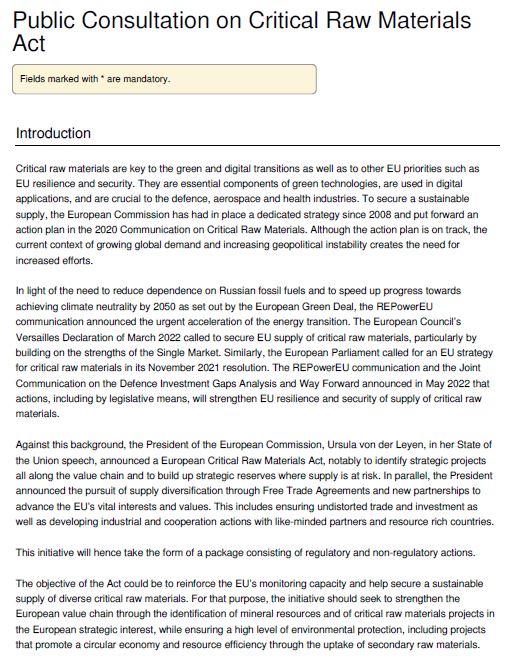
Submission to the EU Public Consultation on Critical Raw Materials Act
Wetlands International Europe, with the support of the Wetlands International Latin America office in Argentina, provided input to the European Commission’s questionnaire as part of its public consultation on a Critical Raw Materials Act.
According to the Commission, the objective of the Act could be to reinforce the EU’s monitoring capacity and help to secure a sustainable supply of diverse critical raw materials. For that purpose, the initiative should seek to strengthen the European value chain through the identification of mineral resources and of critical raw materials projects in the European strategic interest, while ensuring a high level of environmental protection, including projects that promote a circular economy and resource efficiency through the uptake of secondary raw materials.
Lithium is a key raw material for electric devices and vehicles. A huge reserve of this material is in the so called “Lithium triangle” (Argentina, Chile and Bolivia) and the risk is that uncontrolled extraction would have a negative impact on wetlands and its communities.
For lithium mining from brine in the High Andean wetlands, it is necessary to implement land-use regulations that guarantee the conservation of the High Andean wetlands in the lithium triangle region. Moreover, we believe that the role of these ecosystems in providing key resources for Andean communities as well as contributing to climate change adaptation must be more widely considered and valued by the authorities responsible for decision-making on the use of the area and its natural resources.
Accordingly, the current regulations must be adapted to these purposes, and environmental land-use regulations taken forward. The latter must include the identification of key wetland sites for preservation, as well as updates to the various forms of environmental evaluation procedures – Strategic Environmental Evaluation and Environmental Impact Evaluation – in accordance with the singular characteristics of these ecosystems.
Considering the above:
- We call on the countries spearheading the energy transition and demanding lithium to share responsibility for how and where this resource in the South American Andes is exploited, in order to minimise its cost to the environment and society.
- We urge them to support research into, and innovation for, the application of new technologies that will consume less water and have a lower environmental impact.
- We further call on those countries to practice responsible and informed consumption, that is conscious of the impacts of the goods and services being consumed, and to evaluate alternatives that promote a circular economy that will reduce the demand for minerals necessary for the energy transition and the pressure that this places on ecosystems.
- More serious efforts are needed to demand an end to planned obsolescence and further policies that promote the reuse and recycling of minerals required in battery production, taking into account the life cycle of the products.

